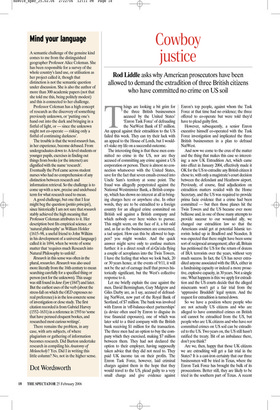Mind your language
A semantic challenge of the genuine kind comes to me from the distinguished geographer Professor Alice Coleman. She has been responsible for a survey of the whole country’s land use, or utilisation as her project called it, though that distinction is not the semantic question under discussion. She is also the author of more than 300 academic papers (not that she told me this, being politely modest) and this is connected to her challenge.
Professor Coleman has a high concept of research as the discovery of something previously unknown, or ‘putting one’s hand out into the dark and bringing in a fistful of light, or — since the unknown might not co-operate — risking only a fistful of continuing darkness’.
The trouble is that the word research has, in her experience, become debased. From undergraduates down to A-level students or younger pupils, exercises in finding out things from books (or the internet) are dignified with the name ‘research’. Eventually the Prof came across student nurses who had no comprehension of any distinction between research and information retrieval. So the challenge is to come up with a new, precise and undebased term for what research used to mean.
A good challenge, but one that I fear might beg the question (petitio principii), since historically I am not sure that research stably achieved the high meaning that Professor Coleman attributes to it. Her description best fits empirical science, or ‘natural philosophy’ as William Holder (1615–98, a useful friend to John Wilkins in his development of a universal language) called it in 1694, when he wrote of some matter that ‘requires much Research into Natural Philosophy to unfold’.
Research in this sense was often in the plural, researches. Research was also used more literally from the 16th century to mean searching carefully for a specified thing or person (not for the unknown). This usage was still found in Jane Eyre (1847) and later. But the earliest uses of the verb (about the stress-fall on which the OED expresses no real preference) is in the less concrete sense of investigation or close study. The first citation recorded is from Gabriel Harvey (1552–1631) in a reference in 1593 to ‘some that have perused eloquent bookes, and researched most curious writings’.
There remains the problem, in any case, with arts subjects, of where plagiarism or gathering of information becomes research. Did Burton undertake research in compiling his Anatomy of Melancholy? Yes. Did I in writing this little column? No, not in the higher sense.


































































 Previous page
Previous page